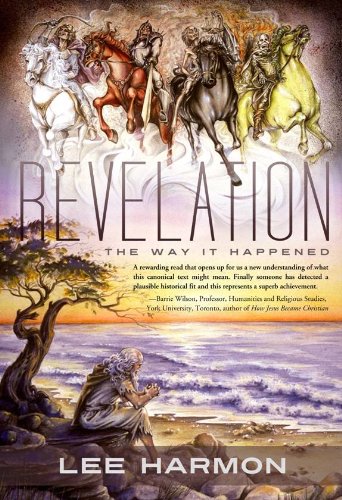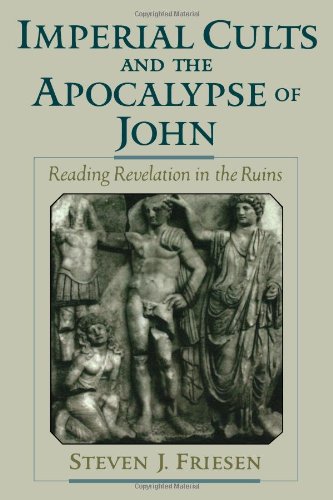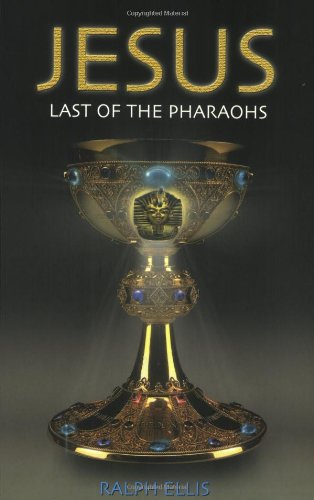Book review: Revelation: The Way it Happened
by Lee Harmon
★★★★
Here’s another review of my book on Revelation. It can be found on Goodreads, by reader Logan, at: http://www.goodreads.com/book/show/9688311-revelation
“This was a very intriguing read. It is a sort of hybrid between a historical novel and an exegetical review of Revelation. It gives us much of the supposed context of the writing of this book in the form of dialogues between various historical and fictional characters interrupted intermittently by ‘interludes’ that provide us with factual explorations of the historical and psychological context of Revelation. The historical context is unquestionably true and described in thorough detail: the influence of Rome, Greece, Jewish tradition, ancient preJudaic tradition, Jesus, &c. The mental context is also most probably true, and can be assumed through the historical lens: the interpretation of Jewish literature at the time, the meaning of the Messiah to the small sect of believers calling themselves Christians, the pressure of Rome and Judaism on commoners, &c. Both of these lend to the specific story that Harmon has created, a story in which a reactionary group writes a richly historical and allusive but also intensely innovative work of preChristian literature.
“Harmon does not treat Revelation as necessarily ‘true’ in the Christian sense, and so he provides an objective look at the proper historical roots of this rather odd book. I greatly enjoyed reading it, as well, for I am someone greatly interested in the Bible but largely unread on the subject of the Apocalypse and its proper place in the Judaeo-Christian canon. Both Christian and nonChristian alike would be well advised to simply try this book if they consider the Bible anything worth taking seriously.”

2 Chronicles 36:9, That Evil Child
Jehoiachin was eight years old when he began to reign, and he reigned
three months and ten days in Jerusalem: and he did that which was evil in
the sight of the LORD.
//Ever wonder if a child could sin? Apparently so, enough for him to be
labeled evil at age eight. Jehoiachin was a chip off the old block; his
father did evil, and the uncle who replaced him after Nebechednezzer
kidnapped him and carried him off to Babylon did evil in the sight of God.
Other prodigies may have been a bit more responsible. King Josiah, who was
also crowned at age eight, reigned for thirty one years. He did that which
was right in the sight of the Lord.
Were these the youngest kings in the Bible? Nope. Joash was seven years
old when he began to reign, and he reigned forty years in Jerusalem.
Joash, like Josiah, did what was right in the eyes of the Lord.
The lesson? If you’re gonna be king, and want to last more than a few
months, do what’s right.
Note: While most Hebrew translations say Jehoiachin was king at age eight,
one Hebrew manuscript and some Septuagint manuscripts say eighteen years in 2 Kings 24:8.
Book review: Has God Spoken?
by Hank Hanegraff
★★★★
From the introduction: “This book counters such contentions and crafts a cumulative case for the absolute authority of the Bible. It answers the question, ‘Has God spoken?’ in the affirmative and demonstrates beyond a reasonable doubt that the Bible is divine rather than merely human in origin. Without such assurance, Christianity would not have any more authority for faith and practice than does Islam, Mormonism, or a host of other misguided movements.”
I offer the above quote to set the tone of the book. I had a hard time with this book merely because of Hanegraff’s style. Not that his writing isn’t good—it’s actually quite superb and fun to read—but because he’s so downright feisty! He takes on an apologetic role, zealously attacking Bart Ehrman, President Obama, Bill Maher, or Richard Dawkins on every other page. When he’s not dissin’ scholars, he’s dissin’ fellow religions.
He says, “It is as unlikely that Jews falsified the Exodus as it is that they fabricated the Holocaust. Archaeology provides a wholly plausible framework for Jewish contentions regarding their enslavement and emancipation. While archaeology has thoroughly discredited the Book of Mormon, internal evidence provides credence to the people, places, and particulars found in the biblical text.” Oh, wow. Need I say more? One thing archaeology can say for certain is that there were never two million people tromping around in the desert for forty years.
Nevertheless, the book does hold your attention! I definitely never grew bored. It’s a little like listening to a talk show host that drives you totally bonkers, but that you can’t shut off.
At times, Hanegraff’s apologetic stance left me bewildered. He had no trouble arguing for the historic reliability of the flood story in the Bible, while in the next breath ridiculing earlier versions of the flood myth, such as the Epic of Gilgamesh. Does he really not recognize that the Hebrew version of the story is just as fantastic as the others? He then waffles on the subject, suggesting that perhaps Genesis implies a local flood rather than a worldwide one, and thus totally misses the point of the myth: That the ark was necessary to sustain life on the earth, because God was going to destroy everything he had made.
If you can ignore the sermonizing, however, there is a lot of thought provoking conversation in the book. I particularly enjoyed Hanegraff’s discussion of typology. Was Isaiah thinking of Jesus as he wrote about a young maiden giving birth to the child Immanuel? No, not according to Hanegraff (and he’s surely right), Isaiah was writing about his own time period. Did Hosea have Jesus in mind when he wrote, “Out of Egypt I have called my son?” Of course not, he was writing about Israel, not Jesus. How about Jeremiah’s words, quoted by Matthew to highlight the slaughter of the innocents by Herod: “A voice is heard in Ramah, weeping and great mourning, Rachel weeping for her children and refusing to be comforted, because they are no more.” This quote highlights the utter silliness of imagining that Matthew was taking these prophesies as predictive; unquestionably, Matthew rightly understood this passage in Jeremiah to be a warning to the southern kingdom of Judah that they were about to experience what happened to Israel. These are not predictive prophecies, but typological prophecies. In this discussion, Hanegraff brings the Bible’s prophecies back to life in a believable and recognizable way. As Hanegraff explains, Matthew saw a historical pattern of events from the past that corresponded to present situations, and he saw them as quintessential fulfillments. The historical patterns reached a climax in the life of Jesus.
Other topics that I enjoyed were the discussion of archaeological finds, of the Abomination of Desolation (Hanegraff’s preterist tendencies subtly poke through here and there), and of figurative language in the Bible. Hanegraff writes a great book, he just gets a little too aggressive at times.

Jonah 3:3, How Big Was Nineveh?
So Jonah arose, and went unto Nineveh, according to the word of the LORD. Now Nineveh was an exceeding great city of three days’ journey.
//Quite a sizable city for antiquity, right? Three days, it took, to walk through Nineveh! Or so we assumed from the Bible, until excavations showed the size of Nineveh to be less than three square miles. Most of us could meander across the city in less than an hour.
But the King James Version of the Bible was translated before excavations showed Nineveh’s true size, so it rendered the original Hebrew in the most straightforward fashion.
Now that we know the truth, however, Bible translators struggle to relay this verse. The NRSV continues the original tradition: “Now Nineveh was an exceedingly large city, a three days’ walk across.” Others rewrite the verse, guessing at what the author meant, such as this NLT rendition: “This time Jonah obeyed the LORD’s command and went to Nineveh, a city so large that it took three days to see it all.” The NIV version tiptoes even more carefully: The 1978 version claims Nineveh was so large that “it took three days to go all through it,” but six years later, the NIV revised its interpretation of the “great city” to emphasize not how large the city was, but how important: “Now Nineveh was a very important city–a visit required three days.”
Mostly, the careful wording of each interpretation reflects a willingness or unwillingness to accept exaggeration within the scripture.
Got an opinion? 6 commentsRevelation 22:2, Are We in Heaven?
On each side of the river stood the tree of life, bearing twelve crops of fruit, yielding its fruit every month.
//Big deal, eh? If I want fresh fruit in today’s world, I take a short walk to the supermarket any time of year.
Revelation promises we’ll never thirst again, never hunger again. I can’t say I’ve ever been really thirsty or really hungry in my life.
Revelation says there will be no night in heaven. Electricity has delivered on the promise.
As Lisa Miller says in Heaven: Our Enduring Fascination with the Afterlife, “Real life has delivered on so many of the Scripture’s promises of heaven. We have glittering cities, blossoming public parks with gushing fountains, libraries filled with books in every language, and a government predicated on justice and equality for all. We have gyms and Pilates classes that keep our bodies youthful, Botox to ensure that our faces remain unlined.”
Our every desire lies before us, and all it takes is a little cash. Far from money being the root of all evil, it appears to be the currency of heaven.
Universalists may be disappointed to learn that not all people attain heaven. Jesus promised many mansions there, and at the height of the housing boom in America, nearly 70% of us lived in homes of our own, homes that would seem extravagant if compared to Bible days. But that leaves 30% still outside the pearly gates. Perhaps hell exists as well? The blessed have money, while the not-so-blessed must be atoning for the sins of a past life.
Yes, it appears heaven has arrived, yet something remains awry. In heaven, says Revelation, there will be no tears. Yet those lives enjoying heaven-like conditions seem just as fraught with tears as those dwelling in hell. Even with all our comforts, it turns out that heaven isn’t so heavenly after all.
Got an opinion? 0 commentsBook review: What’s In A Version?
by Henry Neufeld
★★★★★
Henry Neufeld operates Energion Publications at http://energion.com. I’ve read a couple other books that he promotes, but never one he authored himself. If What’s In A Version is representative of his work, then I’m hooked!
Different Bible interpretations each carry a different emphasis. The New International Version (NIV) and the New Living Translation (NLT) emphasize that their translators are evangelical. Other translations, such as the Revised English Bible (REB) and the New Revised Standard Version (NRSV) emphasize the variety on their translation committees, including interfaith participation.
So, given that translations purposefully vary, how is a person supposed to make an informed decision without knowing the source languages (Hebrew, Greek, Aramaic)? Henry has a BA and MA in Biblical Languages, and writes for the purpose of making the Bible more accessible to the laity. I found this book to be a practical and friendly guide, describing how translations are made, so we readers are better able to understand the arguments for or against various versions. Numerous examples manage to turn what I thought would be a dry discussion into fascinating reading. A chart at the back of the book is helpful in providing an overview of the differences of various common translations. (After reading Henry’s book, I know better than to call these differences “strengths” or “weaknesses,” just decisions made for focus, translation preference, and religious emphasis!)
I did find a few formatting and editing errors, which was a minor distraction.

John 14:6, Jesus, the Only Way
Jesus saith unto him, I am the way, the truth, and the life: no man cometh unto the Father, but by me.
//I was asked recently what this verse means to me, given my liberal Christian stance. If liberal Christians validate other religions on equal footing, then what do we make of Jesus’ claims of exclusivity? I don’t think there’s such a thing as a “typical” liberal Christian, but I can answer this question in my own way.
First, Jesus was unique, with a powerful message of compassion punctuated by an astounding sacrifice. I live in awe of Jesus, and Christianity is my heritage. Even as I recognize that every believer in every religion lays equal claim to the mystery of God, Jesus is still the one for me.
But back to John’s claim of exclusivity. Were there other Gandhis and Martin Luther Kings 2,000 years ago? Were there other humanitarian teachers of enlightenment, of life in abundance? Or was Jesus the only way? Even if there were others, I’m not sure John (or the author of the fourth Gospel, if it wasn’t the apostle John) would have been aware of them. But even if he were, can we really fault John for his loyalty to Jesus, particularly in the arena of religion? Even today, when a person experiences the Spirit, when he feels the presence of God, he tends to proclaim his discovery in exclusive terms. “I’ve found it! The one right way to live, the way of God’s approval!” The first-century Christian claim of exclusivity seems as natural then as it is of today’s variety of religions.
Got an opinion? 0 commentsBook review: Imperial Cults and the Apocalypse of John
by Steven J. Friesen
★★★★★
If you are a serious student of Revelation, this is a book you must read. I don’t think there’s another book like it … yet. That Revelation’s warnings often relate directly to the Imperial Cult of the late first century has been understood for a long time, but this book tackles the topic head on, in scholarly fashion. Friesen relates what archaeology has discovered about Caesar worship in Asia Minor, Revelation’s target audience. Much can be gathered from the study of coins, temple ruins, and writings. The Caesars were often simulated into the worship of traditional Greek deities, and what we understand from archaeology about both the public and mystery rituals is detailed.
One conclusion Friesen draws is that the Imperial Cult was definitely founded upon Caesar Augustus and his accomplishments. Augustus was worshiped as Zeus, the high god of the Greeks. In my mind, at least, there can be little doubt that the first of the seven kings of Revelation is Augustus … not, as some preterists insist, Julius Caesar. Friesen also concludes that the Flavians, including Vespasian and Titus, were also highly honored in myth. This matches the findings and conclusions in my own book, Revelation: The Way it Happened.
Friesen’s book is in two parts: First, the study of the Imperial Cults, and then, how Revelation relates to that study in its direct opposition to Roman imperialism and the abomination of Caesar worship. Of particular interest to readers of Revelation, of course, is Nero Caesar, considered by most to be either the fifth or the sixth king of the seven (depending upon whether you begin counting with Augustus or Julius). Most studied scholars of Revelation agree that, at least on some level, John was surely writing about Nero as the Beast of the Sea.

John 11:47, The First Trial of Jesus
Then gathered the chief priests and the Pharisees a council, and said, What do we? for this man doeth many miracles.
//Much is made of the fact that, unlike the other three Gospels, John’s Gospel records no trial before Caiaphas, the high priest, before Jesus moves on to the court of the Romans. But I think such claimants are not reading John carefully.
Space prohibits me from covering this topic in detail, but you may find it an interesting study. Here is the Johannine version of the trial, in verses 11:47-53. Some of the Jews report the raising of Lazarus from the dead to the Pharisees, resulting in a Sanhedrin session, where the high priest, Caiaphas, decides on a course of action to put Jesus to death. As scholar Raymond E. Brown has noted, if we combine this story with chapter 10 of John, where Jesus debates with the Jews, we have a scene virtually identical to the Synoptic trial. There is even concern expressed by the Jews that the Temple would be destroyed.
The significant difference is that, in John, Jesus isn’t present at his “trial.”
Got an opinion? 0 commentsBook review: Jesus: Last of the Pharaohs
by Ralph Ellis
★★★★
What a fun book! A conspiracy theory in the extreme, but that’s okay. Sometimes it’s entertaining to simply recognize the parallels–in this case, the strong resemblance between Biblical characters and the Pharaohs of Egypt–and run with them, to see where they take you. This book leads deep into Egyptology, relating the stories of the Bible directly to ancient Egypt, and concluding that Judaism, including its offshoot Christianity, stems from ancient Egyptian ritual. You’ll find Abraham, Moses, even Jesus among the Pharaohs.
Ellis’ analysis of the exodus as stemming from the eruption of Santorini is one of the book’s more interesting passages. This isn’t a new idea (see Acts of God, by Graham Philips) but Ellis fleshes it out, explaining the boils on the skin and more. His point is that the Biblical account is historical and fits nicely into the timing of his thesis, relating Moses to the Hyksos people.
Ralph Ellis has produced a suite of similar books, and this is apparently the one that started the ball rolling. Jesus: Last of the Pharaohs has gone through at least two reprintings. There’s an awful lot of original information here, and a lot of conclusions drawn on linguistics and minimal evidence, but if Ellis and his topic piques your interest, there’s much more available to read.
While this is not a religious book, its intent is to uncover the truth about Christianity. It is, according to Ellis, “The true history of religion revealed.” It’s dedicated to his children so that they “may know the truth.” Ellis obviously wants us to take his conclusions very seriously, and change our view about religion. While I can accept that Egyptian history and myth influenced the stories written in the Hebrew scriptures on some level–this should not be terribly surprising if Israel really escaped from Egypt–I can’t quite carry the parallels as far as Ellis does. But I still found the book fascinating and learned a lot.

















 354 Circles
354 Circles
 603 Goodreads Friends & Fans
603 Goodreads Friends & Fans

 Hello! I'm an author, historical Jesus scholar, book reviewer, and liberal Christian, which means I appreciate and attempt to exercise the humanitarian teachings of Jesus without getting hung up on any particular supernatural or religious beliefs.
The Bible is a magnificent book that has inspired and spiritually fed generations for thousands of years, and each new century seems to bring a deeper understanding of life’s purpose. This is true of not only Christianity; through the years, our age-old religions are slowly transforming from superstitious rituals into humanitarian philosophies. In short, we are growing up, and I am thrilled to be riding the wave.
I avidly read all thought-provoking religion titles. New authors: I'd love to read and review your book!
Hello! I'm an author, historical Jesus scholar, book reviewer, and liberal Christian, which means I appreciate and attempt to exercise the humanitarian teachings of Jesus without getting hung up on any particular supernatural or religious beliefs.
The Bible is a magnificent book that has inspired and spiritually fed generations for thousands of years, and each new century seems to bring a deeper understanding of life’s purpose. This is true of not only Christianity; through the years, our age-old religions are slowly transforming from superstitious rituals into humanitarian philosophies. In short, we are growing up, and I am thrilled to be riding the wave.
I avidly read all thought-provoking religion titles. New authors: I'd love to read and review your book!
 Hi! While Lee writes the articles and reviews the books, I edit, organize, and maintain the blog. The views expressed here are Lee's but I'm his biggest supporter! :-)
Hi! While Lee writes the articles and reviews the books, I edit, organize, and maintain the blog. The views expressed here are Lee's but I'm his biggest supporter! :-)
Connect With Me!